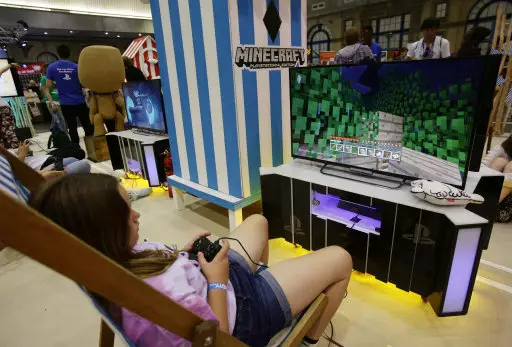
For a long time, video games were a pretty harmless affair. Most titles required the player to perform simple tasks like jumping on stuff, jumping over stuff, or playing ping-pong. That all changed when video games gave the gamer the opportunity to destroy stuff or kill people. Since then, there has been an endless debate on whether gaming is turning young adults into baby-murdering lunatics.
Despite multiple 'this person claims (insert game title) is doing this to (insert age range between 5-18)' there has never been any definitive proof that gaming has negative impacts on the mentality of younger people.
Funnily enough, there seems to be much less spotlight on proving the positive impacts on gaming - so let's try and put an end to that.
Last year, a study revealed that wildly popular world-creating block-building platformer Minecraft was helping the learning process of children with autism, but is there more to it than that?
Well yes there is, quite a bit more.
Dr. Randy Kulman is the founder and president of Learning Works for Kids. He coordinates a team of psychologists, educators, and digital designers in their quest to make video games good for kids.
He's previously argued that Minecraft is a gold mine for children with mild-learning difficulties.
Kulman told me: "Playing problem-solving games can increase the activity in the prefrontal cortex of the brain which leads to better executive functioning and analytical abilities. There's some evidence that gameplay which taxes the memory can change brain structures and improve working memory."
Obviously there are two sides to the coin; just because a child likes Minecraft due to the freedom it gives them to roam, does not mean the same child should explore the vast landscapes of GTA V.
Indulging in prostitutes and crystal meth in between driving aircraft into people's faces is unlikely to benefit children in any constructive way. There's a reason some games have an 18 warning on the box.

But not straying too far away from the world of Grand Theft Auto, Dr. Kulman added "there is evidence that demonstrates how action games can improve processing speed."
Studies by Brittany Travers, a University of Wisconsin-Madison professor, suggest action games may help children with autism improve their motor skills. She previously published research suggesting poor motor skills correlate with more severe autism symptoms.
So, does that mean we should take footballs and skateboards away from children and just lock them up in their rooms with a PS4?
No, there should be a "Play Diet", according to Dr. Kulman, something "that helps to balance digital play with other forms of play. Too much screen time can definitely be problematic but interestingly, too little screen time has also been correlated with difficulties in psychological adjustment."
So if you're worried about your child playing video games with his friends, rather than playing normal games outside with his friends, you shouldn't be.
An study at the University of Oxford found that young people who indulge in a little video game-playing were better adjusted than those who had never played, or those who played video games for three hours or more.
Despite what the media says about gaming, the research is saying the complete opposite.
Advert
Like many things in life, everything in moderation. And remember, those age restrictions are there for a reason.
Words by Matthew Cooper
Featured Image Credit: